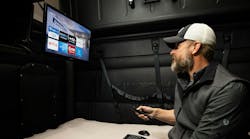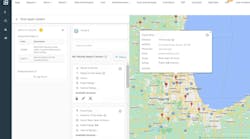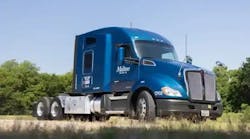King County has dedicated itself to improving its environmental record. The Solid Waste Division of King County, which operates eight transfer stations, two drop-box stations and a 1,000-acre landfill in Maple Valley, WA, is aiding in the effort. King County is the largest County in the state of Washington, with over 2,200 square miles and more than 1.6 -million residents.
“We've been actively working to reduce diesel exhaust emissions in our refuse fleet,” says KC Solid Waste Division project program manager Frank van der Linden. “In 2002 we converted from No. 2 diesel fuel to ultra-low sulfur diesel (ULSD). Our fleet uses about one million gallons of diesel a year, and we are getting good results with the ULSD.”
King County operates a fleet of 55 longhaul tractors, the majority of which are Kenworth T800 units, and 145 refuse trailers manufactured by Reliance Trailer Co.
Van der Linden, along with King County's house environmental investigator Patrick Domres, report that the fleet's newer T800s feature the low-emissions Caterpillar C15 ACERT engine. “But our older fleet is becoming ‘clean’ as well,” van der Linden says. The Solid Waste division has installed catalytic converters on 12 of its trucks and plans to outfit more in the future.
“The combination of ULSD fuel and catalytic converters have yielded a 90% reduction in particulate matter emissions,” he notes. “The first of this year, we also began using a mixture of ULSD and 5% vegetable oil, known as biodiesel, that will help further reduce greenhouse gases.”
The Solid Waste Division employs 71 truck drivers that work a variety of shifts 16 hours per day, seven days a week. The division services all of King County, with the exception of Seattle and Milton.
Garbage is transported 363 days a year. “We receive about one-million tons of garbage annually at the landfill,” van der Linden explains. “This requires a reliable fleet of trucks and dozers. We also need equipment that holds up under difficult conditions.”
Steve Smith and Mike Barker, two shop supervisors at the KC Solid Waste Division, say they are always looking for ways to enhance fleet operations, such as through improved maintenance practices.
“The 18 new trucks we currently have on order will be equipped with a Groeneveld auto-lube system,” says van der Linden. “Since the system automatically lubricates the truck at routine intervals, this will reduce time otherwise needed for preventive maintenance.”
In addition, the Solid Waste Division has just completed in-house installation of GPS units for the entire refuse fleet, which will enable them to maximize equipment utilization.
Van der Linden points out that the Reliance trailer fleet is equipped with Keith Manufacturing walking floors for off-loading, and 36 of the newer units have rear hydraulic doors that open horizontally more than 90 degrees for easy unloading. All of the trailers are also spec'd with sealed wheel hubs for low maintenance and watertight floors for environmental reasons.
While protecting the environment through improved fleet operations, King County is also working toward less dependence on non-renewable resources like fossil fuels. Van der Linden reports that the Cedar Hills Regional Landfill will house a new power plant capable of burning and converting methane — a byproduct of decaying garbage — into 26 megawatts of electricity, enough to power 16,000 households. The plant, scheduled to open in mid-2006, is being constructed by Houston-based Energy Development Inc. (EDI).


